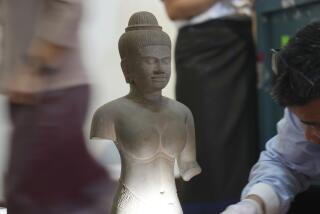On Asia tour, Obama sees traces of his late mother’s work
President Obama sat down here this week with the American director of the Asian Development Bank to review the work product of a contractor who had delivered business financing and leadership training to poor women in Southeast Asia.
The papers showed the lacework of tight, cursive handwriting of Obama’s mother, Ann Dunham, who died at age 52 in 1995. A scholar and anthropologist, she had spent her final years as a consultant to U.S. agencies and foundations aiding the world’s poor.
The ADB collection reveals new details, if no great surprises, about his late mother’s career. But even among the no-nonsense office memos and notes are signs of the passion that drove her work.
Dunham was the “key ingredient” of a women’s project that was going well, one colleague wrote. Cottage industries were flourishing because of her expertise, said another.
“She was a figure in her own right, respected by the people who worked with her,” said Robert M. Orr, the U.S. ambassador to the Asian Development Bank, who asked the ADB staff to search the microfiche archives for traces of Dunham’s work. “These records show that so clearly.”
Obama ended a weeklong tour in Asia on Tuesday with remarks to Philippine and American forces. He recalled the heroic defense their forebears -- and a few aging veterans in the audience -- put up against Japanese troops at Bataan and Corregidor during the early days of World War II. He praised how they stood balikatan, or shoulder-to-shoulder.
Tagalog and Bahasa Malaysia are not languages Obama learned as a child in Indonesia, but he has peppered his toasts and speeches with local phrases in Kuala Lumpur and Manila. When he does, listeners say he speaks their language with an Indonesian accent.
Dunham clearly was on his mind as he crossed the region. He told one crowd about the colorful dyed batik fabrics she eagerly sought out in Jakarta, the Indonesian capital where she took her young son to live in 1967.
Those handiworks, he said, gave her a window to cultures and people she found fascinating, he said.
Since Obama became president, academics have focused on Dunham’s work, including the University of Hawaii, which held a symposium on her research. An exhibit of her collection of batik textiles from Java has toured the United States and Duke University Press published a book in 2009 based on her 1992 doctoral dissertation about peasant blacksmithing in Indonesia.
At a town hall meeting with young people in Kuala Lumpur, Obama was asked if he had any regrets. He grew somber and choked up a bit.
“I regret not having spent more time with my mother,” he said. “She died early ... it happened very fast, in about six months. And I realized that -- there was a stretch of time from when I was, let’s say, 20 until I was 30, where I was so busy with my own life that I didn’t always reach out and communicate with her and ask her how she was doing and tell her about things.”
In the documents given to Obama, he’ll find traces of those last days, according to Orr. In February 1995, one staffer wrote to another that Dunham was going back to Hawaii for medical treatment.
Records reflect that she continued to write and call about her work for a few months but they trickled off as she underwent treatment for the uterine cancer that ultimately took her life.
Over the last few months, the ADB tracked the documents down by finding receipts of paychecks made out to her and then digging up the projects she had worked on based on that information.
As he saw what their search had yielded, Orr said he wanted to share them with the president. Orr, a former Boeing executive and Stanford professor, had advised Obama on foreign policy in the 2008 campaign.
“If I had a book like this of my father’s work, that showed his day-to-day work, I know I would treasure it so much,” Orr said. “I hope the president will too.”
More to Read
Sign up for Essential California
The most important California stories and recommendations in your inbox every morning.
You may occasionally receive promotional content from the Los Angeles Times.










